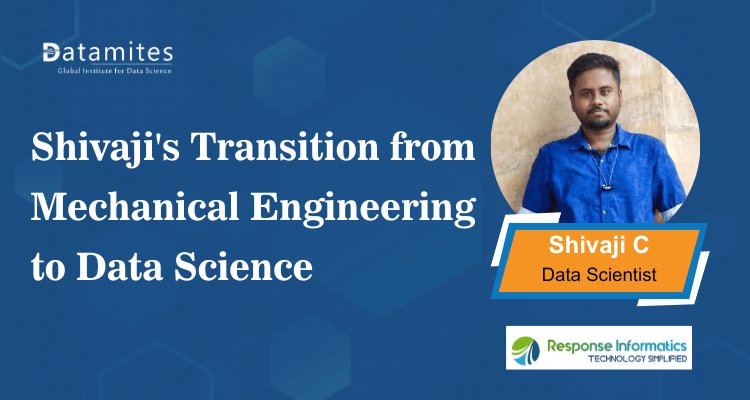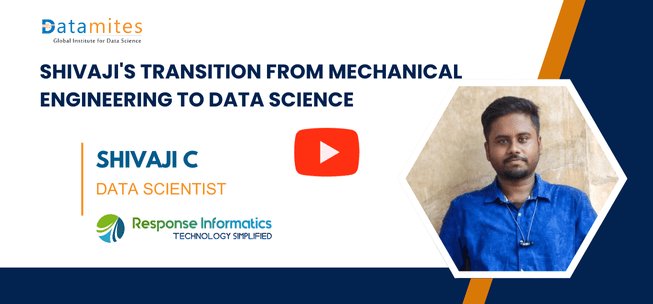Shivaji's Transition from Mechanical Engineering to Data Science
Shivaji successfully transitioned from a mechanical engineering background to a thriving career in data science. His journey highlights the power of upskilling, perseverance, and adapting to new technologies.

In today’s world, the demand for data science professionals is at an all-time high. With businesses leveraging data to make strategic decisions, the field has become one of the most exciting and impactful industries. But for many professionals, the transition into data science isn’t a straightforward path. One such individual who exemplifies this inspiring journey is Shivaji, who made a remarkable switch from mechanical engineering to data science. His story serves as an inspiration to those considering a career shift or those looking to break into the world of data science.
Shivaji's Inspiring Data Science Journey with DataMites
A story of passion, perseverance, and the pursuit of meaningful impact through data-driven decision-making.
Q1: Can you tell us about yourself and your professional background?
I’m Shivaji Chatterjee, originally from Assam. I completed my Bachelor's degree in Mechanical Engineering in 2020. Like many others, COVID impacted my career path right after graduation. However, I always had a strong interest in mathematics and statistics. That led me to explore fields where I could use those skills, and I found data science. After some research, I joined the offline classroom program at Datamites institute in Bangalore to begin my transition into the IT industry.
Q2: What motivated you to switch from mechanical engineering to data science?
I’ve always enjoyed mathematics. I was looking for a field that could leverage that interest, and data science seemed like the perfect fit. It’s rooted in math and stats, but also highly impactful and in-demand. For anyone who enjoys solving problems with numbers and logic, data science is a great field.
Q3: How did you start your journey into data science?
I began by researching the skills and knowledge required for a data science role. Recognizing the need for structured learning, I enrolled in a comprehensive data science course offered by DataMites. The curriculum covered essential topics like Python programming, machine learning, and data visualization, which provided a solid foundation for my career transition.
Q4: What challenges did you face during this transition?
One of the main challenges was adapting to a new field with different terminologies and methodologies. However, the structured approach of the DataMites course, along with hands-on projects, helped me grasp complex concepts effectively. Additionally, balancing learning with other responsibilities required discipline and time management.
Q5: How did DataMites support your career transition?
DataMites played a crucial role in my journey. The course content was comprehensive and aligned with industry requirements. The mentors were experienced professionals who provided valuable guidance and feedback. Moreover, the placement assistance offered by DataMites helped me secure a position as a Data Scientist at Response Informatics.
Q6: How did you prepare yourself for the placement process?
I took offline classes regularly. Each class was around 2 to 2.5 hours, and I made sure to revise whatever was taught as soon as I got back. I believe consistency is key. If I didn’t understand something, I made a note of it and cleared it in the next class. The instructors were really supportive. They encouraged us to ask questions and guided us through our doubts patiently.
Q7: Can you share your experience with the placement process?
The placement process was well-structured. DataMites provided support in resume building, interview preparation, and connecting with potential employers. The mock interviews and real-world projects included in the course equipped me with the confidence and skills needed to succeed in actual interviews.
Q8: What role have you been offered, and how does it align with your long-term goals?
I’ve started my journey as a Data Science Intern at Response Informatics, which is a fantastic learning experience. It’s a great learning opportunity where I’m gaining exposure to real-world data workflows, how models are developed, and how they are integrated into products. I’m also learning about software development processes and deployment techniques like Git. My long-term goal is to move into AI development—working on intelligent systems like chatbots and more advanced machine learning applications. So yes, this role is definitely a stepping stone in the right direction.
Q9: Could you share some insights into your interview experiences and the challenges you faced?
I attended three interviews before securing this role. In the first one for a Business Analyst position, I was confident in Python and ML but struggled with SQL, which highlighted the need for improvement in that area. The second interview focused on coding and theoretical concepts, testing my Python logic and problem-solving skills. During technical rounds, I was asked to explain ML algorithms, their use cases, advantages, and limitations, which made me realize the importance of holistic preparation.
Q10: What specific skills do you think are crucial for cracking a data science interview?
For coding rounds, having strong Python skills is essential, along with the ability to build logic and solve problems under time pressure. In technical rounds, it's crucial to understand the theory behind algorithms, including when and why to use them. You should also be familiar with techniques to improve model accuracy, the appropriate metrics to use, and the necessary preprocessing steps. Effective communication is key—you must be able to clearly articulate your thought process.
Q11: How did you stay motivated after facing rejections?
I kept reminding myself that failure is the pillar of success. Each rejection taught me something valuable—what to improve, where I went wrong. I used that feedback to work harder and refine my skills. Staying positive and treating each failure as a learning opportunity helped me move forward.
Q12: Did you work on any personal or freelance projects that helped boost your practical skills?
Yes, actually. While in Bangalore, I also explored freelancing opportunities to support myself. I worked on small projects for clients in the U.S. and Hyderabad. These experiences gave me practical exposure—how to handle real-world data, communicate with clients, and deliver on requirements. It really helped me understand the project lifecycle beyond just building models.
Q13: In your interviews, were you asked to write complete code or just showcase your approach?
Most of the time, they focused on my approach and reasoning. They wanted to see if I could grasp the problem and come up with a solid solution. As long as the logic was sound and I could explain it clearly, minor syntax errors were usually overlooked.
Q14: What kind of work are you doing now as a data science intern?
Right now, I’m supporting the team with short-term tasks—data cleaning, analysis, minor automation scripts, and learning how to integrate models into software. It’s a continuous learning process, and I’m enjoying every bit of it.
Q15: What are your long-term goals in this field?
My long-term goal is to move into AI. Currently, our company is working on chatbot development and similar applications. That has sparked my interest further. I want to eventually work on more advanced AI systems and contribute to building intelligent solutions.
Q16: How did you manage the balance between personal life and studies, especially being away from home?
That’s a good question. Since I’m from Assam and was studying in Bangalore, I had already left my family and friends behind to focus on my career. It was a conscious decision. I believe if you want to gain something, you have to sacrifice something. Of course, taking breaks and enjoying moments is important, but career building was my main focus, and I stayed committed to that.
Q17: What advice would you give to others considering a career switch to data science?
I would advise aspiring data scientists to stay curious and committed to continuous learning. Start by building a strong foundation in programming and statistics. Get involved in practical projects to put theoretical knowledge into action. Seek mentorship and leverage resources like DataMites that offer structured learning paths and career support. Most importantly, believe in your ability to adapt and grow in a new field.
Refer these articles:
- Manohar’s Journey: From Mechanical Engineer to Data Scientist
- Partha’s Data Science Journey: From Beginner to Data Scientist
- Neelam Jaswanth’s Journey to Success in Data Science
Key Takeaways from Shivaji's Journey
His transition from mechanical engineering to data science showcases the power of passion, persistence, and continuous learning in shaping a successful career.
- Passion for Mathematics: Shivaji’s love for math and problem-solving naturally led him to data science, aligning with his interests in logic and real-world applications.
- Transition from Mechanical Engineering: While mechanical engineering provided strong technical skills, data science offered a better platform for applying his mathematical passion to data-driven challenges.
- Self-Learning: Shivaji dedicated himself to mastering statistics, machine learning, and programming languages like Python to transition into data science.
- Hands-On Experience: Participating in Kaggle competitions and data science challenges allowed him to apply theory to real-world problems.
- Interview Insights: Employers valued problem-solving approach and logic over complete code, with an emphasis on explaining thought processes.
- Cloud and Big Data: Shivaji recognizes the importance of cloud platforms for managing large datasets and scalability, even though he hasn't worked extensively with them yet.
- Leveraging Engineering Skills: His engineering background provided a unique perspective, enhancing his problem-solving ability in data science.
- Advice for Aspiring Data Scientists: Embrace self-learning, gain practical experience, and be patient with the transition.
- Continual Growth: Shivaji’s journey emphasizes the importance of patience and continuous learning in data science.
- Inspiration for Career Changers: His story proves that with determination and the right skills, anyone can successfully transition into data science.
Shivaji’s journey from mechanical engineering to data science is just beginning, but his story already highlights the importance of adaptability and the power of passion-driven learning. As he continues to develop his skills and dive deeper into the world of data science, there’s no doubt that he will make significant contributions to the field.
Refer these articles:
- Why Data Scientist Career in Bangalore
- Why Data Scientist Career in Hyderabad
- Why Data Scientist Career in Pune
Shivaji’s journey is a testament to how curiosity, dedication, and resilience can lead to a successful career shift into data science. Given the growing demand for data professionals, now is an excellent time to pursue a career in this field. As per Precedence Research, the global data science platform market is expected to grow from USD 150.73 billion in 2024 to around USD 676.51 billion by 2034, at a CAGR of 16.20%. Enrolling in data science courses in Chennai, Hyderabad, Bangalore, Pune, Mumbai, Delhi, Ahmedabad, and Coimbatore and others can give aspiring professionals a strong start and a competitive edge in this high-growth industry.
To stay competitive in this rapidly evolving field, it's crucial to choose a training institute that offers hands-on projects, internships, and robust placement support.
DataMites Institute stands out as a premier institute offering specialized training in Data Science, Artificial Intelligence, Machine Learning, Python Programming, and Data Analytics. Accredited by IABAC and NASSCOM FutureSkills, DataMites delivers industry-aligned, high-quality education led by experienced professionals.
The institute emphasizes practical learning through real-time projects, internship opportunities, and dedicated placement assistance—ensuring students gain both skills and industry exposure. DataMites offers offline data science training in Bangalore, Hyderabad, Chennai, Pune, Ahmedabad, Coimbatore, and Mumbai.
With expert mentors, a comprehensive curriculum, and a proven placement track record, DataMites empowers learners—whether they are fresh graduates, working professionals, or career switchers—to build a strong foundation and excel in the domains of Data Science, Artificial Intelligence, and Machine Learning.

